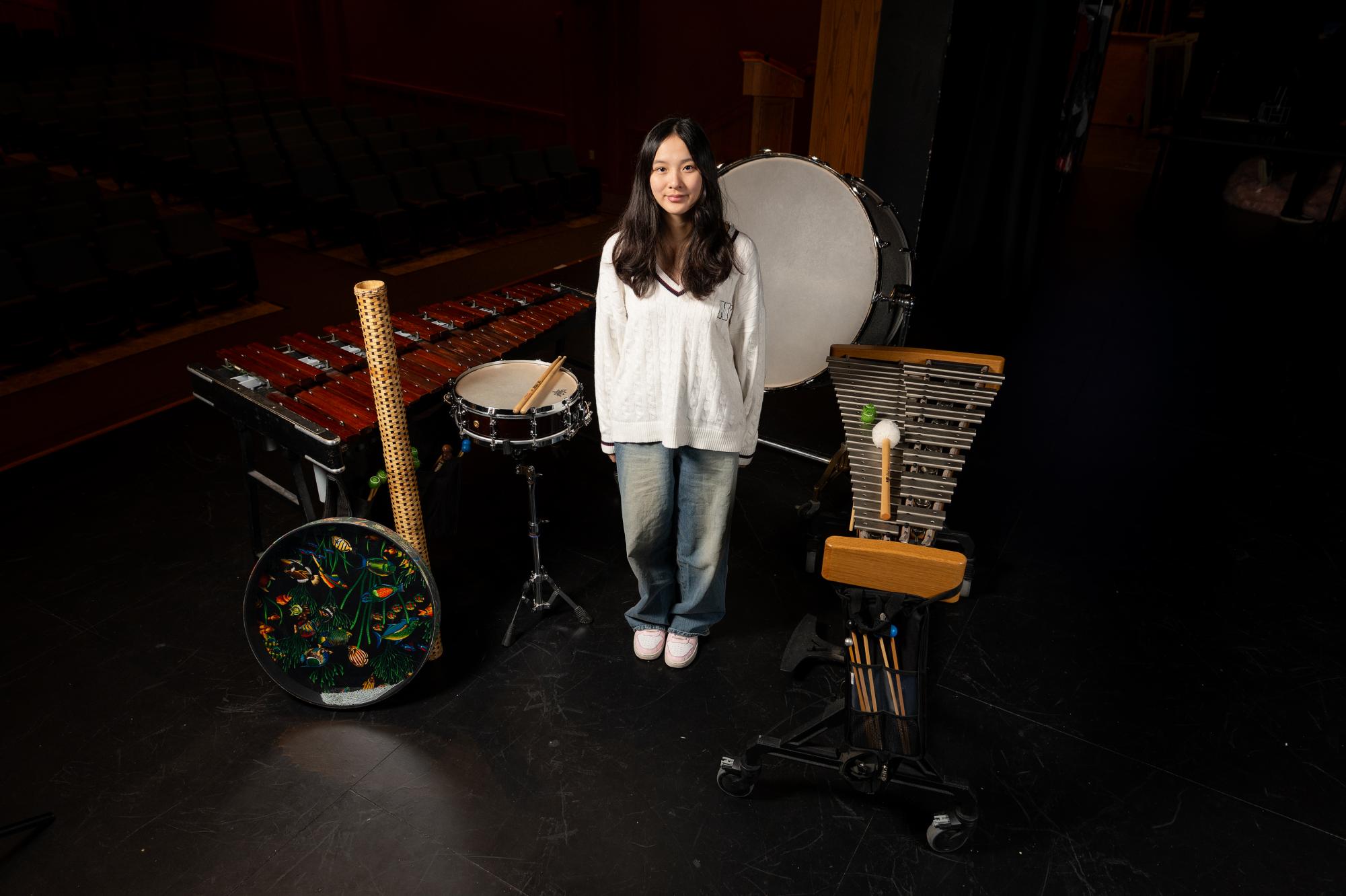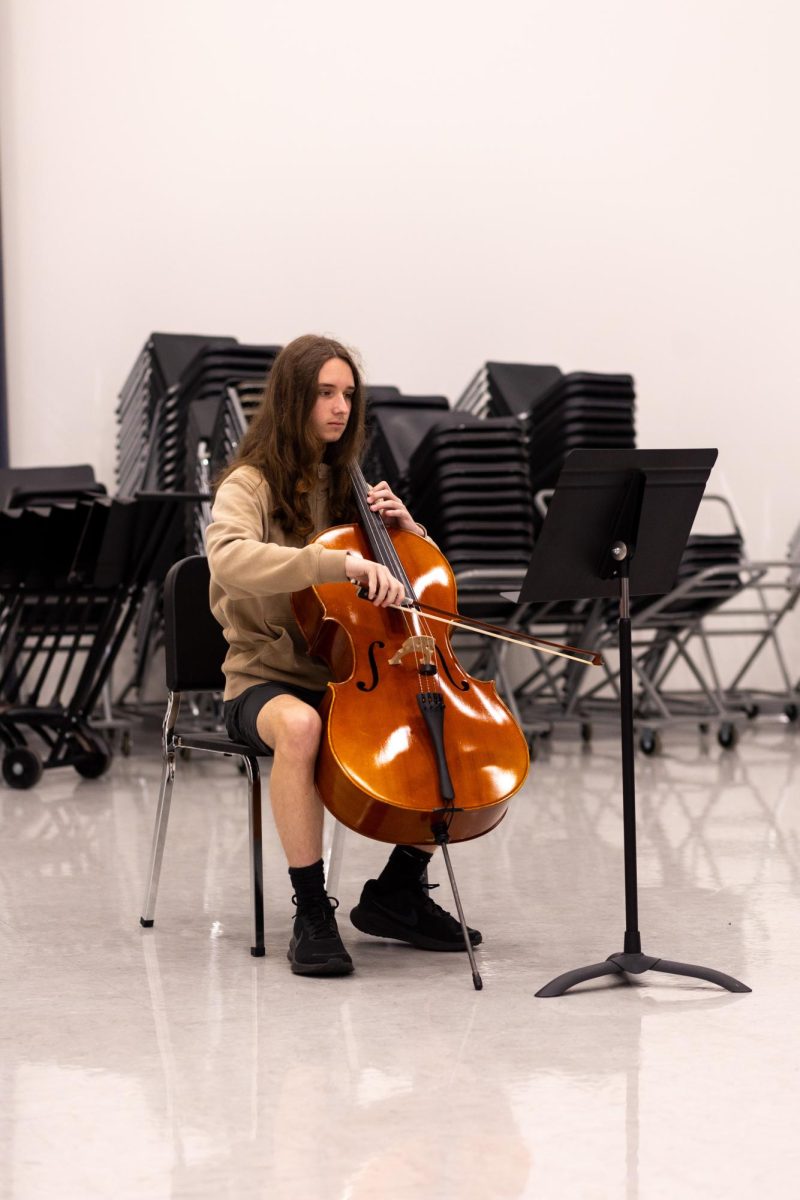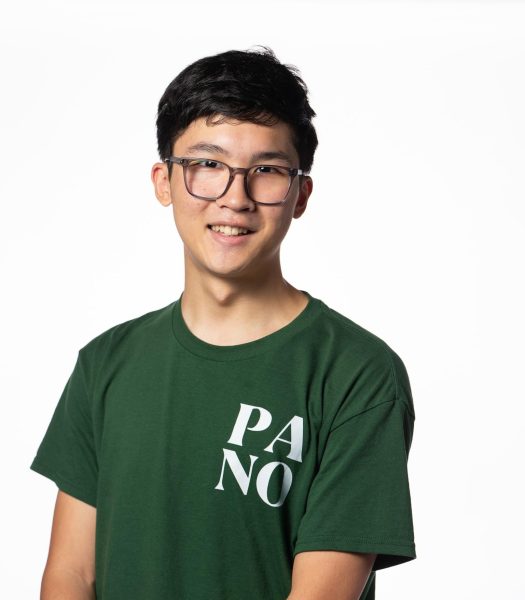Ring. The alarm clock goes off. Creak. The wood planks under the bed groan as she wakes from her slumber. Click. The snare drum opens– a symbolic motion, telling her the time is now. Rat-a-tat. The snare drum begins to sing its monophonic hymn, and Kimmi Lin (11) orchestrates it. Amidst the soft spoken voice and low-tempered manner, Lin begins her morning practice routine.
“Kimmi has the ability to really play perfectly, kind of in almost any situation, including very high pressure ones,” Tim Crockett, Lin’s percussion instructor, said.
Lin has been taking weekly percussion lessons with Crockett for the past seven years. They have prepared for numerous auditions over the years, from local group auditions to the National Youth Orchestra ones.
“Having a private teacher is important because they know more than you do,” Lin said. “[Something] may sound good to me, but it’s not actually that good.”
Kimmi is a percussion player — a musician whose capabilities are open to every instrument that is stricken, slapped or hit. While native to the drum set since age 7, the Ladue Percussion Program has allowed Kimmi to pick up a plethora of other instruments, mainly including timpani, marimba, snare drum, bass drum and several others.

Lin is a part of several musical groups spanning from St. Louis to Taiwan. She is a percussionist for the Saint Louis Youth Symphony Orchestra, Webster Groves Young People’s Symphonic Orchestra and this summer, she received a full scholarship for 2 weeks touring with the Taiwanese National Youth Orchestra in Taiwan, where she was already spending the summer with her family. However, music is only a part of the trip.
“[My favorite part was] meeting the people there,” Lin said. “I feel like Taiwanese people are nicer.”
When playing and studying classical music, it is often a matter of precision — a numbers game, whereas in genres like jazz, it is typically a more creative endeavor. However, Lin finds a way to get the best of both worlds.
“I like listening to jazz more than I like listening to classical music, but I like playing classical music more than I like playing jazz,” Lin said.
Many view music as a pure form of expression, but Lin finds it comparable to other parts of her education.
“You have to learn the notes first, and then you focus on smaller details,” Lin said. “It’s kind of like math. When you practice, you have to repeat it a lot. You have to learn the formulas, you have to apply them and they get harder.”

(Vincent Hsiao)
In Missouri, there are two opportunities to compete as musicians. All-suburban is composed of students from districts in the metro area, and all-state is composed of students competing from the entire state of Missouri. Lin has placed first chair for every audition for the past two years. However, her approach to practicing these monotonous etudes is unconventional. She uses highlighters to signify musical notation to read it by color, rather than by inked notation. Sharps are pink. Flats are blue. Loud is cool colors and warm is warm colors.
“I usually have to color my sheet music or else I almost can’t read it,” Lin said. “It’s how I first learn it. I color it before I first play it. It makes it easier to approach music because it looks so cute. I did it on my all-state music last year and it’s on my all-state music this year too. Last year, I put stickers on it so I would be motivated to practice.”
While music is often seen as a solo endeavor through concertos or long hours in the practice room, the real value is extracted out of the camaraderie of playing in a group.
“It’s both,” Lin said. “You have to like music personally, but the group makes it different.”
Norah Murphy (11) has been playing alongside Lin in the Ladue percussion section since seventh grade, often competing against each other for out-of-school music groups. They currently play together in the Saint Louis Symphony Youth Orchestra the Webster Groves Young People’s Symphonic Orchestra.
“She’s very sarcastic and humorous, but when she’s playing percussion, she’s very serious and down-to-business,” Murphy said. “Kimmi is as good as it gets considering percussion. Her strong suit is being able to be precise and accurate.”
While music is often a great unifier, competition can often separate friend and foe. However, Murphy and Lin’s friendship surpasses the division of rivalry.
“Kimmi and I are very good friends,” Murphy said. “I love Kimmi because I can talk to her about percussion, but also just [about] my normal life.”
Lin is Taiwanese and visits every summer. During her trip a few summers ago, she picked up a teaching venture not directly related to percussion, but it turned into a takeaway for her practice routine back home.

“Two years ago in Taiwan, I taught my mom’s friend’s kids English and ukulele,” Lin said. “It taught me that I don’t think I’d be a good teacher. I was impatient. I need to take a lot of breaks and I incorporate that into my practice.”





![School resource officer Rick Ramirez sits in his office. He usually spends little time in his office throughout his day of work, focusing on other issues. “Where our students are, I try to be,” Ramirez said. “Sometimes I get off at 2:45 p.m. when nothing’s going on, or sometimes I get off at 10 p.m. [Those are] my hours.”](https://laduepublications.com/wp-content/uploads/2024/12/Hsiao_20241203_ID_RickRamirez_007-799x1200.jpg)

![Reva poses in front of her home and address plaque. After reuniting with her father and grandparents, she has made many new memories and retained her culture. “We have a lot of Indian cooking going on,” Reva said. “I also like telling people about Indian food, mainly because that’s something that really connects me to [Mumbai].”](https://laduepublications.com/wp-content/uploads/2024/12/At-Home-1200x799.jpg)


